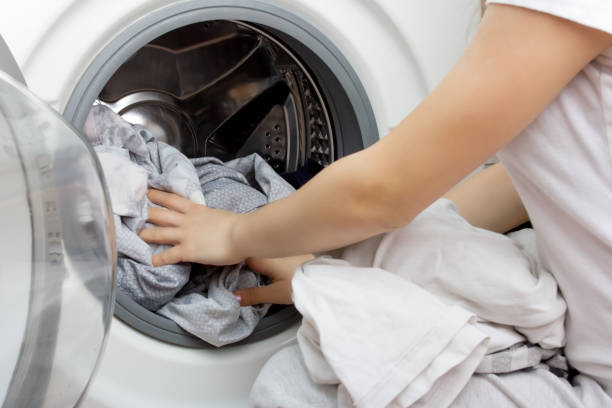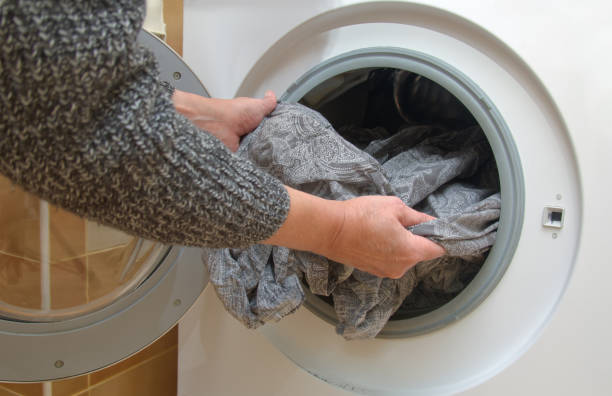When it comes to ensuring your washing machine remains in tip-top condition, knowing whether bleach or vinegar is better for a deep cleanse is invaluable. While both common household items have their respective cleaning powers, we’ll delve into which one is most effective for your machine’s longevity and hygiene. This article will explore whether the robust sanitizing power of bleach or the natural acidity of white vinegar provides the best solution for your laundry companion.
Introduction to Washing Machine Maintenance
Maintaining your washing machine is as crucial as using the right detergent for your clothes. A well-kept machine not only washes more effectively but also lasts longer. The importance of regular cleaning can’t be overstated—it prevents the build-up of mold, mildew, and detergent residue that could also lead to unpleasant odors and compromised machine performance. Both front-loading and top-loading washers will need a different approach to maintenance due to their unique designs, but they all require some form of regular cleaning to keep running smoothly.
| Maintenance Task | Description |
|---|---|
| Clean the Drum Regularly | Use a washing machine cleaner or a mixture of vinegar and baking soda to clean the inside of the drum monthly to prevent odors and buildup. |
| Inspect and Clean the Filter | Check the lint filter (if applicable) and the drain pump filter regularly, cleaning them to prevent clogs and ensure efficient operation. |
| Check Water Hoses | Inspect the water inlet hoses for leaks, cracks, or wear and replace them every 3-5 years to prevent water damage. |
| Keep the Washer Level | Ensure your washing machine is level to prevent excessive vibration, noise, and wear on the machine’s components. |
| Leave the Door Open After Use | Allow the drum and gasket to dry out between washes by leaving the door (and detergent drawer) open to prevent mold and mildew. |
| Use the Proper Amount of Detergent | Follow the manufacturer’s recommendations for detergent use to avoid excess suds, which can lead to buildup and odors. |
| Perform a Monthly Maintenance Wash | Run an empty wash cycle with hot water and a washing machine cleaner to clean the drum and remove detergent residue. |
When considering cleaning agents for your washing machine, the battle often boils down to two main contenders: bleach and white vinegar. Both have distinct properties that make them suitable for different parts of the cleaning process. Bleach is a powerful disinfectant known for ensuring a deeper clean, while white vinegar, a mild acetic acid solution, does not have the same disinfecting power but is excellent for removing limescale and soap scum.

The Case for Bleach
Bleach is often the go-to choice for eliminating bacteria and viruses, ensuring your washing machine is not just clean, but sanitized. When using bleach to clean your washing machine, the process typically involves adding 1 cup (or the manufacturer’s recommended amount) of bleach to the detergent dispenser, then running the washing machine on the hottest cycle with the hottest water setting. This combination will help to remove any germs and stubborn stains from washer drums and other interior surfaces.
However, safety considerations when using bleach are paramount. Bleach is a strong and potent chemical that might need to be used with care, particularly in homes with children, pets, or individuals with respiratory issues. It might not be suitable for all types of washing machines—especially those with stainless steel drums, which could be damaged by harsh chemicals. When used improperly, bleach can lead to the degradation of machine parts over time.
Best practices for using bleach include:
- Always dilute bleach with water before adding it to the machine. Pure bleach could be too harsh on some internal components.
- Open windows or ensure proper ventilation when using bleach to avoid inhaling fumes that can be harmful.
The Case for Vinegar
On the other side of the cleaning spectrum is white vinegar, a household staple that can all too easily be underestimated for its cleaning prowess. Vinegar’s natural acidity is its greatest asset, breaking down mineral deposits and detergent build-up with ease. A solution of white vinegar and water could help to maintain the washing machine’s efficiency without the harsh side effects of stronger chemicals.
Benefits of using vinegar in your washing machine:
- It’s non-toxic and safe to use in homes with children, pets, or individuals with sensitivities to strong chemicals.
- White vinegar does not leave behind residues that attract dirt, leading to a cleaner wash for longer periods.
How to Use Vinegar to Clean Your Machine:
- Pour one cup of white vinegar directly into the washer drum.
- Set your washing machine to run on the hottest cycle with the highest level of water.
Using vinegar not only cleans but it also naturally softens fabrics, which can be an added bonus for your laundry. It’s worth noting, however, that while vinegar is great for general maintenance and deodorizing, it doesn’t kill as many germs and bacteria as bleach does. Therefore, it might not be the best option for those looking to sanitize their machines thoroughly.

Comparative Analysis
When weighing the efficacy of bleach versus vinegar, one must consider the different attributes each possess. Bleach is undoubtedly a stronger disinfectant capable of killing a wider spectrum of microorganisms, including viruses and bacteria that vinegar simply cannot eliminate. In terms of sheer sanitization, bleach takes the lead, particularly in times where disinfecting is a high priority, such as during flu season or in the aftermath of illness in the home.
However, cost considerations come into play as well. White vinegar is typically less expensive than bleach and can be bought in large quantities at a lower price. Additionally, the environmental impact should not be underestimated—bleach is a chemical that can be harmful to wildlife and ecosystems if not treated properly by water treatment plants, whereas vinegar is biodegradable and poses less risk to the environment.
Efficacy Comparison:
- Bleach has a stronger ability to disinfect and kill a broad range of pathogens.
- Vinegar is effective for removing limescale, soap scum, and odors but has less disinfecting power.
User Experiences and Expert Recommendations
Anecdotal testimonials and feedback from users can be insightful. Some homeowners swear by the use of vinegar for maintenance cleans and appreciate its natural composition. Others, especially those with family members who suffer from allergies or respiratory conditions, may find that a sanitized environment is non-negotiable and thus, prefer bleach despite its harsher chemical profile.
Experts often recommend assessing your needs and the frequency of cleaning when choosing between bleach and vinegar. If someone in your household is ill, bleach is a strong ally in the fight against contagion. For regular maintenance, however, white vinegar is a safe and effective option.
What Do the Experts Say?
- Use bleach for deep sanitization, particularly in health-critical situations.
- Opt for vinegar for regular maintenance that’s safe for the environment and the household.

Conclusion
In conclusion, both bleach and vinegar serve important roles in cleaning and maintaining washing machines. The choice between the two should be informed by your specific needs, the level of cleanliness required, the type of washer you own, and your personal health and environmental concerns. If you need a deep, disinfecting clean and do not have an adverse reaction to chemicals, bleach is your best bet. However, for regular maintenance and a gentler option, white vinegar is more than sufficient. Regular use of either cleaning agent will help ensure your machine runs efficiently and effectively, providing you with clean clothes and peace of mind.
For those who value eco-friendliness and safety over powerful disinfection, vinegar typically comes out on top. Despite this, don’t underestimate the need for periodic deep cleans where bleach could be the more appropriate choice. Ultimately, alternating between the two while considering their strengths and weaknesses may provide the best combined approach for keeping your washing machine in pristine condition.
FAQ
Q1: Can I mix bleach and vinegar when cleaning my washing machine?
A1: No, you should never mix bleach and vinegar. This combination produces chlorine gas, which is toxic and can be very dangerous when inhaled.
Q2: How often should I clean my washing machine with bleach or vinegar?
A2: It’s recommended that you clean your washing machine once a month. However, if your machine seems especially dirty or has a noticeable odor, you may need to clean it more frequently.
Q3: Will bleach damage my washing machine’s septic system?
A3: In moderate amounts, bleach will not usually damage a septic system, as it is diluted with water when used for cleaning purposes. However, excessive usage could harm beneficial bacteria in the system, so use it sparingly.
Q4: Is it safe to clean a stainless-steel drum with vinegar?
A4: Yes, it’s safe to use vinegar to clean a stainless-steel drum. Vinegar is non-abrasive and won’t harm the surfaces of stainless-steel drums. It’s an effective descaler and deodorizer for these types of washing machines.
Q5: Can I use cleaning vinegar instead of white vinegar for a deeper clean?
A5: Yes, cleaning vinegar has a higher concentration of acidity than white vinegar and could provide a deeper clean. However, you should always dilute it according to the manufacturer’s instructions to avoid damaging your washing machine.
